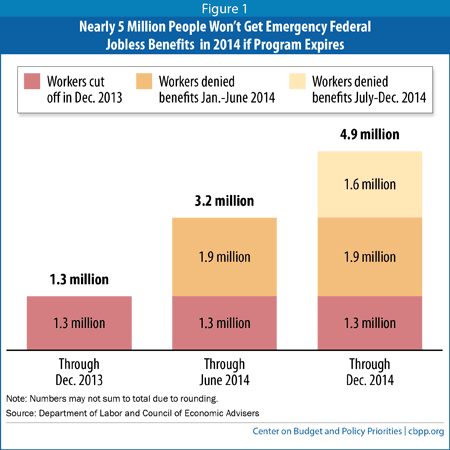PDF of
this report (3pp.)
By Chad
Stone
December 11, 2013 - Center on Budget and Policy Priorities
A needed extension of federal emergency jobless benefits was absent from this
weekfs budget agreement, potentially leaving almost 5 million jobless workers in
the lurch over the next 12 months, according to Department of Labor estimates.[1] Failure to extend the Emergency Unemployment
Compensation (EUC) program would affect jobless workers in every state.
As Figure 1[2] shows:
- An estimated 1.3 million jobless workers now receiving EUC will receive no
benefits after Christmas week if the program expires as scheduled.
- An estimated 1.9 million people receiving regular state unemployment
insurance (UI) payments, which typically run for a maximum of six months, will
exhaust them in the first half of 2014 before they can find a job. If
EUC expires, these workers will receive no further benefits.
- An estimated 1.6 million people who lose their jobs in the first half of
2014 will exhaust their regular state UI in the second half of the year before
they can find a job. If EUC expires, these workers will receive no
further benefits.
In all, an estimated 4.9 million workers would lose out on EUC benefits by
the end of 2014.

Emergency federal UI programs like EUC are designed to phase down as the
labor market improves and eventually expire. The phasing down is underway
— the maximum number of weeks of EUC plus regular UI has fallen from 99 to 73,
and that maximum is available in only a handful of states — but it is too soon
to let the program expire.
While the unemployment rate has fallen from its recession peak to 7.0
percent, this measure alone provides too optimistic a picture of the overall
health of the labor market:[3]
- The share of the population with a job, which plunged in the recession to
levels last seen in the 1980s, has changed little in the ensuing four
years. The recession drove many people out of the labor force, and lack
of job opportunities in the ongoing jobs slump has kept many potential
jobseekers on the sidelines. Many of these people would like to work
and, in a stronger labor market, they would likely have a job or at least be
looking, but they are not looking actively enough to be counted as officially
unemployed. Their absence from the ranks of the officially unemployed
keeps the unemployment rate lower than it otherwise would be.
- Long-term unemployment remains a significant concern. Nearly
two-fifths (37.3 percent) of the 10.9 million people who are unemployed — 4.1
million people — have been looking for work for 27 weeks or longer. These
long-term unemployed represent 2.6 percent of the labor force. At 2.6
percent, the long-term unemployment rate is at least twice as high as
when any of the emergency federal UI programs that policymakers enacted in
each of the previous seven major recessions expired.
Table 1 shows the Department of Laborfs estimates of the number of people in
each state that would be affected over the next 12 months if EUC is allowed to
expire. In 11 states, more than 100,000 people would lose access to
benefits.
Table
1
People Losing Access to Emergency Unemployment
Compensation
Through December 2014 if Program Expires as
Scheduled |
| State |
Unemployed losing access to
benefits |
State |
Unemployed losing access to
benefits |
| Alabama |
48,100 |
Nebraska |
16,700 |
| Alaska |
23,300 |
Nevada |
60,300 |
| Arizona |
67,000 |
New Hampshire |
8,500 |
| Arkansas |
40,300 |
New Jersey |
260,100 |
| California |
836,100 |
New Mexico |
25,500 |
| Colorado |
72,800 |
New York |
383,000 |
| Connecticut |
85,100 |
North Carolina |
0* |
| Delaware |
13,800 |
North Dakota |
7,900 |
| District of Columbia |
18,200 |
Ohio |
128,600 |
| Florida |
260,400 |
Oklahoma |
33,000 |
| Georgia |
164,700 |
Oregon |
76,100 |
| Hawaii |
13,300 |
Pennsylvania |
262,500 |
| Idaho |
20,300 |
Puerto Rico |
80,200 |
| Illinois |
230,500 |
Rhode Island |
21,700 |
| Indiana |
69,300 |
South Carolina |
52,400 |
| Iowa |
35,500 |
South Dakota |
1,600 |
| Kansas |
35,300 |
Tennessee |
79,000 |
| Kentucky |
53,200 |
Texas |
285,200 |
| Louisiana |
30,400 |
Utah |
20,200 |
| Maine |
18,100 |
Vermont |
5,100 |
| Maryland |
82,600 |
Virgin Islands |
3,500 |
| Massachusetts |
141,000 |
Virginia |
69,900 |
| Michigan |
189,700 |
Washington |
94,100 |
| Minnesota |
65,500 |
West Virginia |
24,700 |
| Mississippi |
37,600 |
Wisconsin |
99,000 |
| Missouri |
84,500 |
Wyoming |
6,700 |
| Montana |
14,300 |
|
|
*Emergency Unemployment Compensation is
not available in North Carolina because earlier this year, the state cut
weekly UI benefit levels in violation of federal rules that require
states that accept emergency federal benefits to maintain their benefit
levels.
Source: Department of Labor and Council of
Economic Advisers |
End notes:
[1] The Council of Economic Advisers and the Department of
Labor, gThe Economic Benefits of Extending Unemployment Insurance,h December
2013, Figure 7, p. 18, http://www.whitehouse.gov/sites/default/files/docs/uireport-2013-12-4.pdf.
[2] Adapted from the Council of Economic Advisers and
Department of Labor report.
[3] Chad Stone, gOn Emergency Jobless Benefits, Donft Be
Fooled by Novemberfs Drop in Unemployment,h Off the Charts blog, Center
on Budget and Policy Priorities, December 10, 2013, http://www.offthechartsblog.org/on-emergency-jobless-benefits-dont-be-fooled-by-novembers-drop-in-unemployment/.
